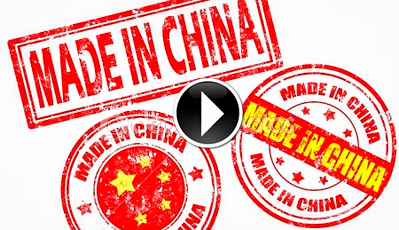 |
For the past decade, "Made in China" has been one of the most recognizable brands in the world and has enjoyed a far-reaching popularity around the globe.
In every corner of the earth, when talking about China and the world, "Made in China" is a term that would always pop up from your lip.
The world has felt an increasing impact of China over the past decade, especially after it joined the World Trade Organization (WTO). "Made in China" played a key role in this process.
|
It's hard to imagine how life would be without Chinese products.
Concerning this, no one knows better than the American journalist Sara Bongiorni, who wrote the famous book A Year Without "Made in China".
Bongiorni and her family attempted to "boycotting" any products made in China for a whole year. However, her "adventure" only ended up in a series of troubles.
Bongiorni realized that to live without "Made in China", the person's living cost will increase dramatically.
What did Bongiorni finally conclude from this one-year experience? [Story] |
 |
 |
Elites run the world, but they are those ordinary people that constitute 99 percent of the world's population. "Made in China" is a boon for the masses.
This has become more evident over the past decade, especially since 2008.
After the global financial crisis, the number of "one dollar shops" in the United States has increased greatly, and some even appeared in high-end communities. The American middle classes began to join the group of the regular visitors to these stores. Among those in the "one dollar shops", Chinese products took up a large percent.
"All of a sudden, you realized that, oh, shoot, everything with good quality comes from China," Holyfield said to this journalist in 2008. [Story] |
"Made in China" is not only a boon for the masses, but also a blessing for foreign businesses. For the last decade, alien companies have reaped huge benefits from "Made in China".
With the rising trend of global economic integration, "Made in China", to some extent, has evolved to "Made with China", or even "Made for China", making multinational corporations share the "Chinese bonuses".
The international sporting goods brand Nike has been involved in China for over 30 years, with about one third of its products made in, or to say, with China and more than 7,000 retail stores established in that country.
With over 1.3 billion people and the rising income growth, China has become the most lucrative potential market for almost every ambitious foreign business.
Nike's sales surpassed $2 billion in 2011 in the world's most populous country, making China the biggest market outside the United States. [Story] |
 |
 |
For the past decade, "Made in China" has driven China's economic engine forward and made a big share of interests for the world. However, the bitter side of the "Chinese blessing" has remained unmentioned.
A made-in-China official mascot for the 2012 Olympics was priced at £20 in London. However, on the other side of the world in China, the Chinese workers hunched in rows over sewing machines can only get as little as £0.18 from one cuddly toy.
Li Shengjiao, was a senior Chinese diplomat who spent most of his 40-year career overseas and commuted between China and Western countries. He knew made-in-China stuff just as he knew his stuff. [Story] |
| | | | |